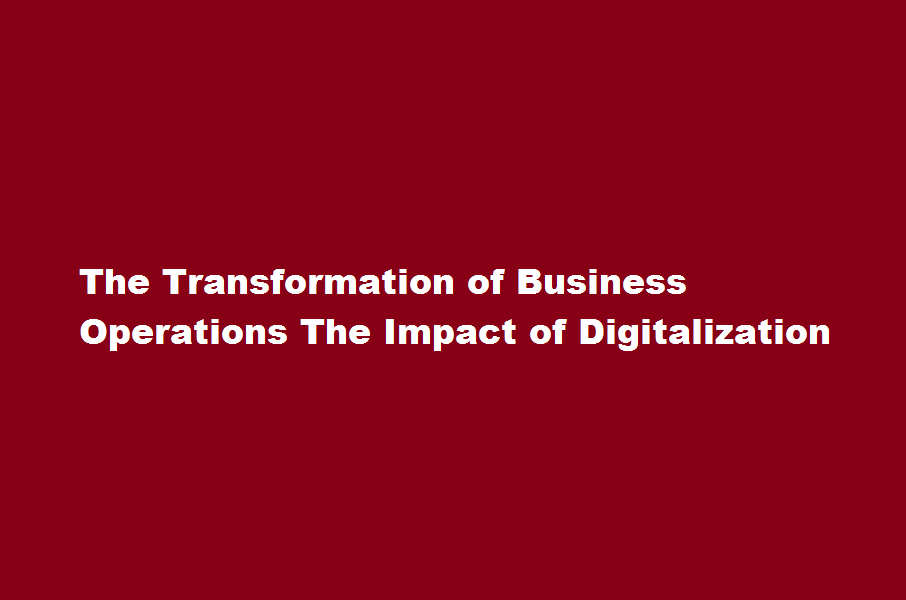The Transformation of Business Operations The Impact of Digitalization
3 min read
In today’s fast-paced and technology-driven world, digitalization has become a fundamental force reshaping the business landscape. From small startups to multinational corporations, organizations are embracing digital transformation to enhance efficiency, improve customer experiences, and stay competitive. Let’s delve into how digitalization has transformed the way businesses operate.
Streamlined Processes and Increased Efficiency
Digitalization has automated and streamlined various business processes, eliminating manual tasks and reducing human errors. Through advanced technologies like artificial intelligence (AI), machine learning, and robotic process automation (RPA), businesses can achieve higher levels of operational efficiency. For instance, inventory management systems can optimize stock levels, supply chains can be monitored and optimized in real-time, and customer data can be analyzed to personalize marketing campaigns.
Enhanced Customer Experiences
Digitalization has revolutionized the way businesses interact with their customers. Through digital channels such as websites, mobile apps, and social media platforms, companies can provide seamless and personalized experiences. Customers can access products and services at their convenience, make purchases online, and receive real-time support through chatbots or virtual assistants. Digital platforms also enable businesses to gather customer feedback and insights, allowing for continuous improvement.
Improved Decision-Making
Digitalization provides businesses with access to vast amounts of data and advanced analytics tools. This wealth of information empowers organizations to make data-driven decisions, identify trends, and predict future market demands. With real-time data, businesses can optimize pricing strategies, tailor marketing campaigns, and identify new revenue streams. Additionally, data analytics can uncover operational inefficiencies and areas for improvement, leading to better resource allocation and cost savings.
Flexible Work Environment
Digitalization has reshaped the traditional office setup, enabling remote work and flexible schedules. Cloud-based collaboration tools, project management software, and video conferencing platforms facilitate seamless communication and collaboration among geographically dispersed teams. This flexibility allows businesses to tap into global talent pools, reduce overhead costs, and improve employee satisfaction and work-life balance.
Agile and Innovative Business Models
Digitalization has paved the way for disruptive business models and marketplaces. Companies like Uber and Airbnb have leveraged digital platforms to connect service providers directly with consumers, revolutionizing the transportation and hospitality industries. Additionally, digitalization enables businesses to quickly adapt to market changes and launch new products or services in response to customer needs. Agile methodologies and rapid prototyping have become prevalent, facilitating innovation and reducing time to market.
Frequently Asked Questions
What are the challenges businesses face during digital transformation?
Businesses often encounter challenges such as legacy systems integration, data security concerns, resistance to change, and the need for upskilling employees to adapt to new technologies.
Can digitalization benefit small businesses?
Absolutely. Digitalization offers small businesses opportunities to reach wider audiences, automate manual processes, and compete on a more level playing field with larger enterprises.
How can businesses ensure data privacy and cybersecurity in a digitalized environment?
Implementing robust cybersecurity measures, conducting regular audits, encrypting sensitive data, and training employees on cybersecurity best practices are crucial steps businesses can take to safeguard data privacy.
Is digitalization only relevant for technology-oriented industries?
No, digitalization is relevant across industries. From healthcare and finance to manufacturing and retail, digital transformation has the potential to benefit organizations of all types.
How can businesses adapt to rapidly evolving technologies?
To adapt to rapidly evolving technologies, businesses can foster a culture of innovation, invest in research and development, collaborate with technology partners, and stay updated with industry trends.
In conclusion, digitalization has transformed the way businesses operate, revolutionizing processes, enhancing customer experiences, and driving innovation. Embracing digital transformation is no longer a choice but a necessity for organizations to stay relevant and thrive in the digital age.
Read Also : Evaluating Financial Health and Stability of Foreign Companies A Comprehensive Guide






